Chia seeds have become increasingly popular in recent years due to their impressive nutritional profile and numerous health benefits. These tiny seeds are loaded with fiber, protein, omega-3 fatty acids, and antioxidants, making them a great addition to a balanced diet. But what happens to your body if you eat chia seeds every day?

Research suggests that incorporating chia seeds into your daily diet can have several positive effects on your body. For instance, chia seeds are known to help improve digestive health by promoting regular bowel movements and reducing inflammation in the gut. Additionally, their high fiber content can help you feel fuller for longer, which may aid in weight loss efforts.
Furthermore, chia seeds are a great source of several important nutrients, including calcium, magnesium, and phosphorus. These minerals are essential for maintaining strong bones and teeth, and they also play a role in various bodily functions such as muscle and nerve function. Overall, incorporating chia seeds into your daily diet can have numerous benefits for your health and wellbeing.
Nutritional Profile of Chia Seeds
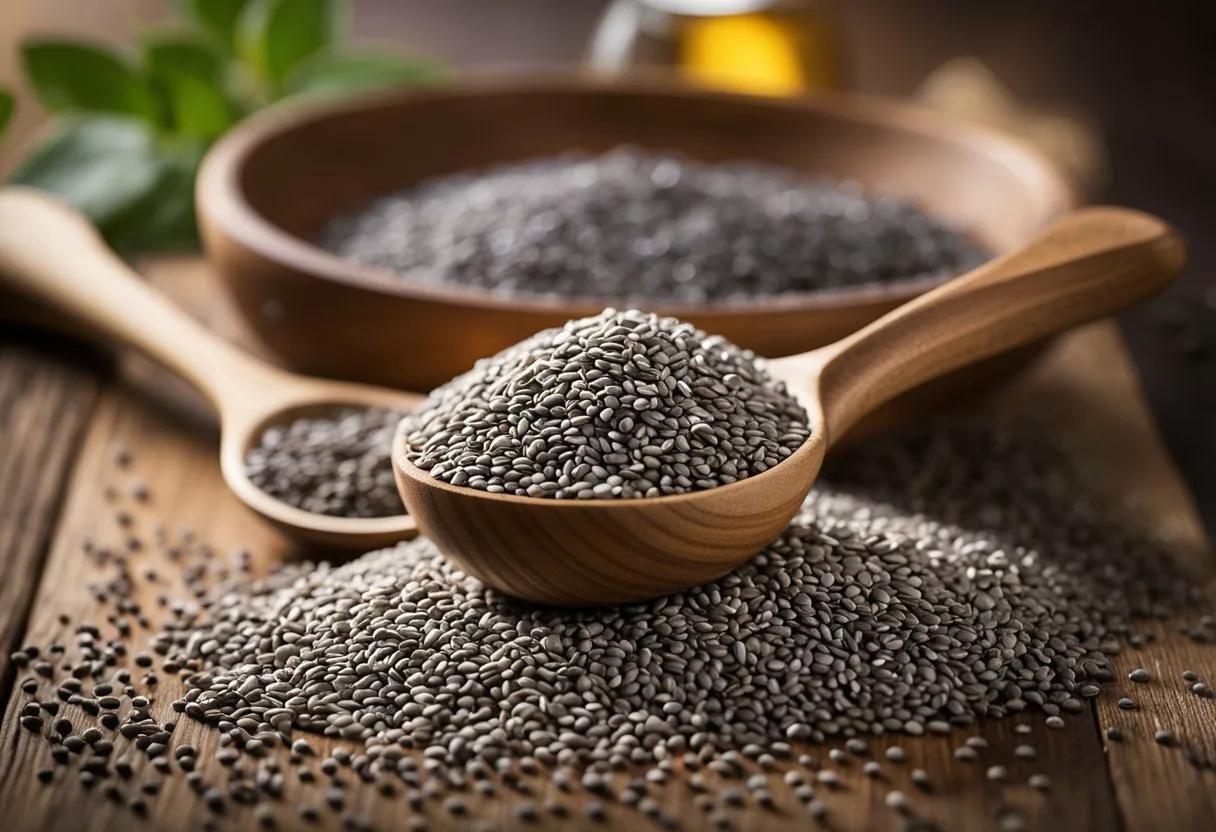
Chia seeds are a tiny black and white seed that is native to South America. They have been consumed for centuries and are known for their numerous health benefits. Chia seeds are a great source of essential nutrients and minerals, high-quality protein, and antioxidants.
Essential Nutrients and Minerals
Chia seeds are a great source of essential nutrients and minerals. One ounce (28 grams) of chia seeds contains 11 grams of fiber, 4 grams of protein, and 9 grams of fat, including 5 grams of omega-3 fatty acids (ALA). They are also a good source of minerals such as calcium, magnesium, phosphorus, iron, and zinc.
High-Quality Protein Content
Chia seeds are a great source of high-quality protein. They contain all nine essential amino acids, making them a complete protein source. One ounce (28 grams) of chia seeds contains 4 grams of protein, which is equivalent to the protein content of one large egg.
Richness in Antioxidants
Chia seeds are rich in antioxidants, which help to protect the body against free radicals that can cause damage to cells and contribute to the development of chronic diseases. Chia seeds contain quercetin, a flavonoid antioxidant that has been shown to have anti-inflammatory and anti-cancer properties.
In conclusion, chia seeds are a great addition to any diet. They are a great source of essential nutrients and minerals, high-quality protein, and antioxidants.
Health Benefits of Daily Consumption
Promotion of Heart Health
Chia seeds are a great source of fiber, omega-3 fatty acids, and antioxidants, all of which contribute to a healthy heart. The fiber in chia seeds helps to reduce cholesterol levels, which can lower the risk of heart disease. The omega-3 fatty acids in chia seeds help to reduce inflammation and lower blood pressure, which can also reduce the risk of heart disease. Antioxidants in chia seeds help to protect the heart from damage caused by free radicals.
Stabilization of Blood Sugar Levels
Chia seeds are a low glycemic index food, which means they are digested slowly and do not cause a rapid spike in blood sugar levels. This makes them an ideal food for people with diabetes or those at risk of developing diabetes. The fiber in chia seeds also helps to slow down the absorption of sugar into the bloodstream, which can further help to stabilize blood sugar levels.
Enhancement of Digestive Health
Chia seeds are an excellent source of fiber, which is essential for maintaining good digestive health. The fiber in chia seeds helps to promote regular bowel movements and prevent constipation. It also helps to feed the good bacteria in the gut, which can improve overall digestive health. Chia seeds also contain mucilage, a gel-like substance that can soothe and protect the digestive tract.
Support for Weight Management
Chia seeds are low in calories but high in fiber and protein, which can help to reduce appetite and promote feelings of fullness. This can make them a useful food for weight management. The fiber in chia seeds also helps to slow down the absorption of food, which can help to reduce calorie intake.
Reduction of Inflammation
Chia seeds are a good source of omega-3 fatty acids, which have anti-inflammatory properties. Inflammation is linked to a range of health conditions, including heart disease, diabetes, and cancer. By reducing inflammation, chia seeds may help to lower the risk of these conditions.
Overall, daily consumption of chia seeds can provide numerous health benefits, including promotion of heart health, stabilization of blood sugar levels, enhancement of digestive health, support for weight management, and reduction of inflammation.
Incorporating Chia Seeds into Your Diet
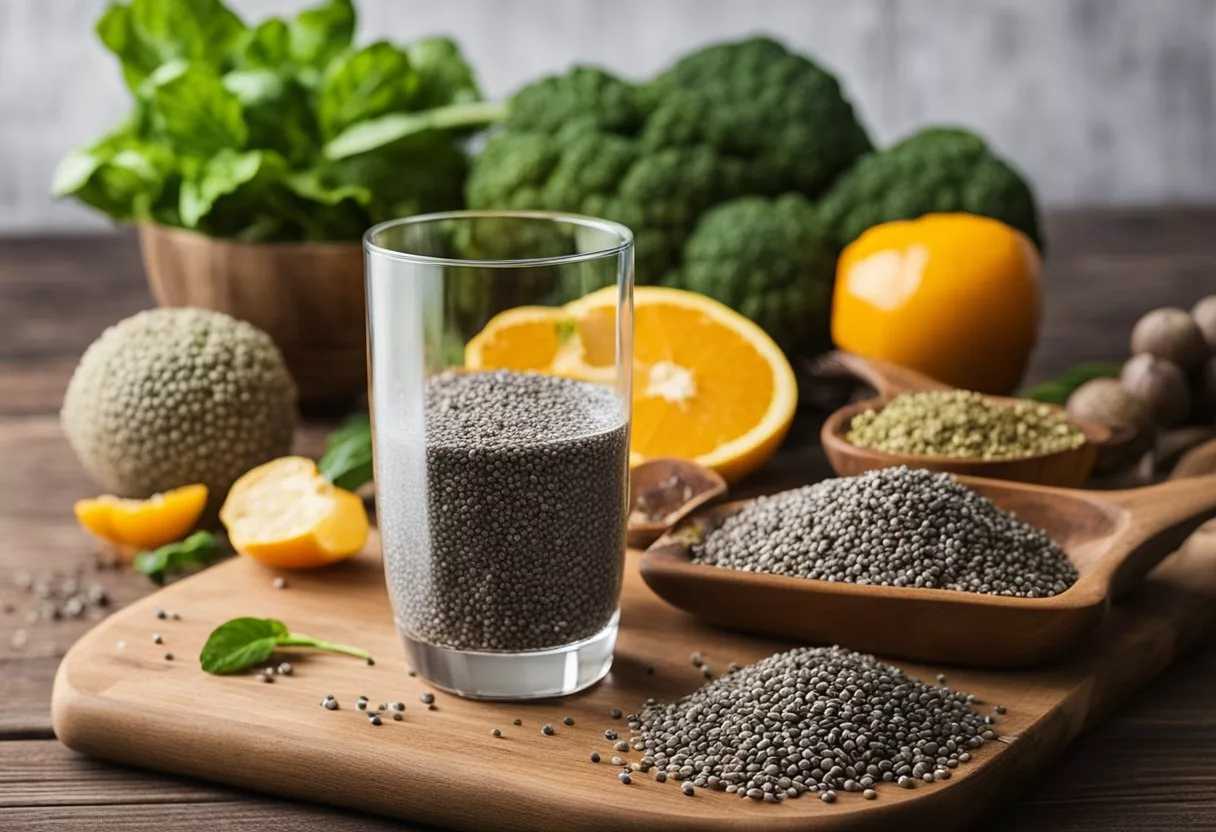
Adding chia seeds to your diet is easy and can be done in a variety of ways. Here are some simple additions to meals and snacks:
Simple Additions to Meals and Snacks
- Sprinkle on Yogurt: Add a tablespoon or two of chia seeds to your favorite yogurt for a quick and easy snack.
- Top Oatmeal or Cereal: Add chia seeds on top of your oatmeal or cereal for an extra crunch.
- Stir into Soups or Salads: Mix chia seeds into your favorite soup or salad for added texture and nutrition.
- Blend into Smoothies: Add a tablespoon of chia seeds to your smoothie for an extra boost of protein and fiber.
Creative Recipe Ideas
- Chia Seed Pudding: Mix chia seeds with your favorite milk and sweetener for a delicious and healthy dessert. Try this recipe for a basic chia seed pudding.
- Baked Goods: Add chia seeds to your favorite baked goods for an extra boost of nutrition. Try this recipe for chia seed banana bread.
- Overnight Oats: Mix chia seeds with your overnight oats for added texture and nutrition. Try this recipe for chia seed overnight oats.
It’s important to note that chia seeds can absorb up to 10 times their weight in water, so be sure to drink plenty of fluids when consuming chia seeds. Additionally, chia seeds are high in fiber, so it’s best to start with a small amount and gradually increase your intake to avoid digestive discomfort.
Incorporating chia seeds into your diet can provide a variety of health benefits, including improved digestion, increased energy, and better heart health. Try adding chia seeds to your meals and snacks for a simple and nutritious addition to your diet.
Potential Side Effects and Precautions
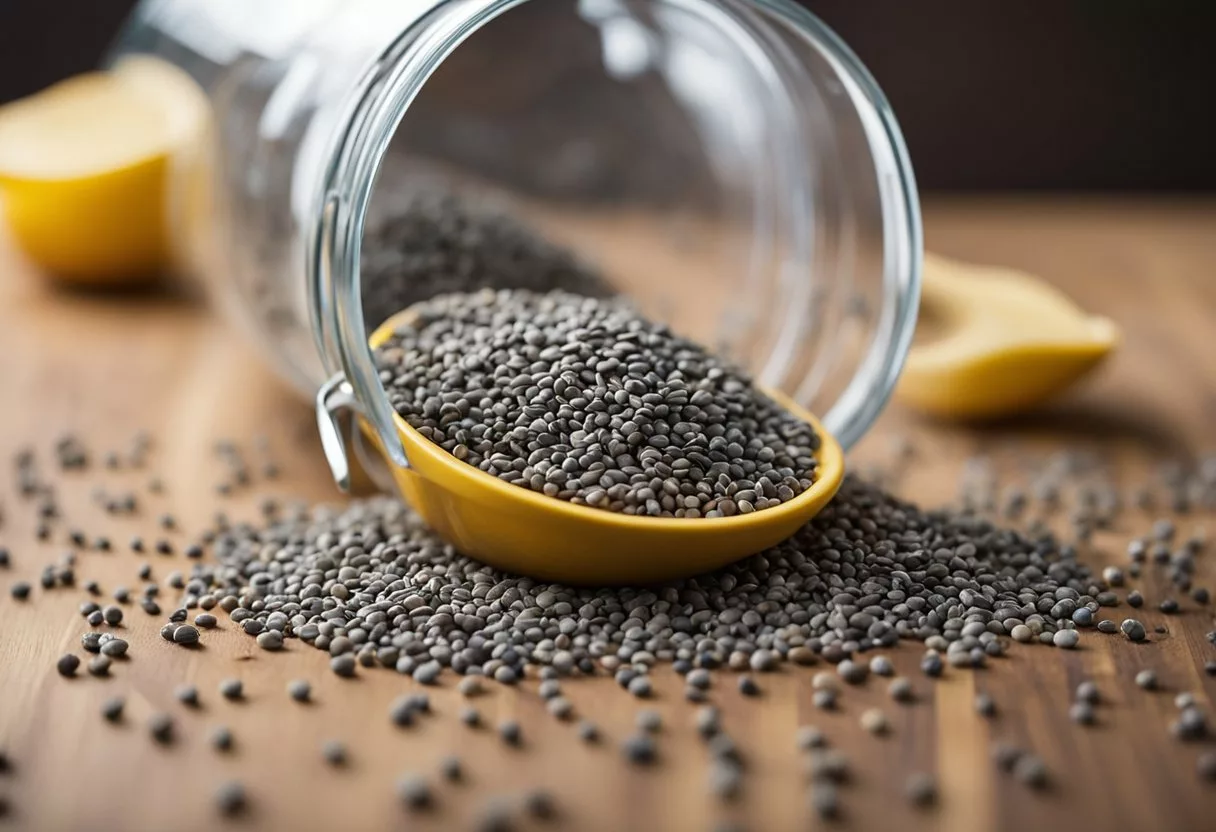
Chia seeds are generally safe for most people when consumed in moderation. However, there are some potential side effects and precautions to keep in mind.
Digestive Issues and Allergies
Chia seeds are high in fiber, which can be beneficial for gut health. However, consuming too many chia seeds can cause digestive issues such as gas, bloating, and diarrhea. According to Mount Sinai, about 2 tablespoons of chia seeds pack nearly 10 grams of fiber, which can be too much for some people.
Additionally, some people may be allergic to chia seeds. Allergic reactions to chia seeds are rare, but they can occur. Symptoms of an allergic reaction may include hives, itching, swelling, and difficulty breathing. If you experience any of these symptoms after consuming chia seeds, stop consuming them and seek medical attention immediately.
Interactions with Medications
Chia seeds may interact with certain medications, particularly blood pressure medications. Chia seeds may lower blood pressure, so if you are taking medication to lower your blood pressure, consuming large amounts of chia seeds may cause your blood pressure to drop too low.
Additionally, chia seeds may interact with blood thinners and other medications. If you are taking any medications, it is important to talk to your healthcare provider before adding chia seeds to your diet.
Overall, chia seeds can be a nutritious addition to a balanced diet. However, it is important to consume them in moderation and to be aware of potential side effects and interactions with medications. If you have any concerns about consuming chia seeds, talk to your healthcare provider.
Historical and Cultural Significance
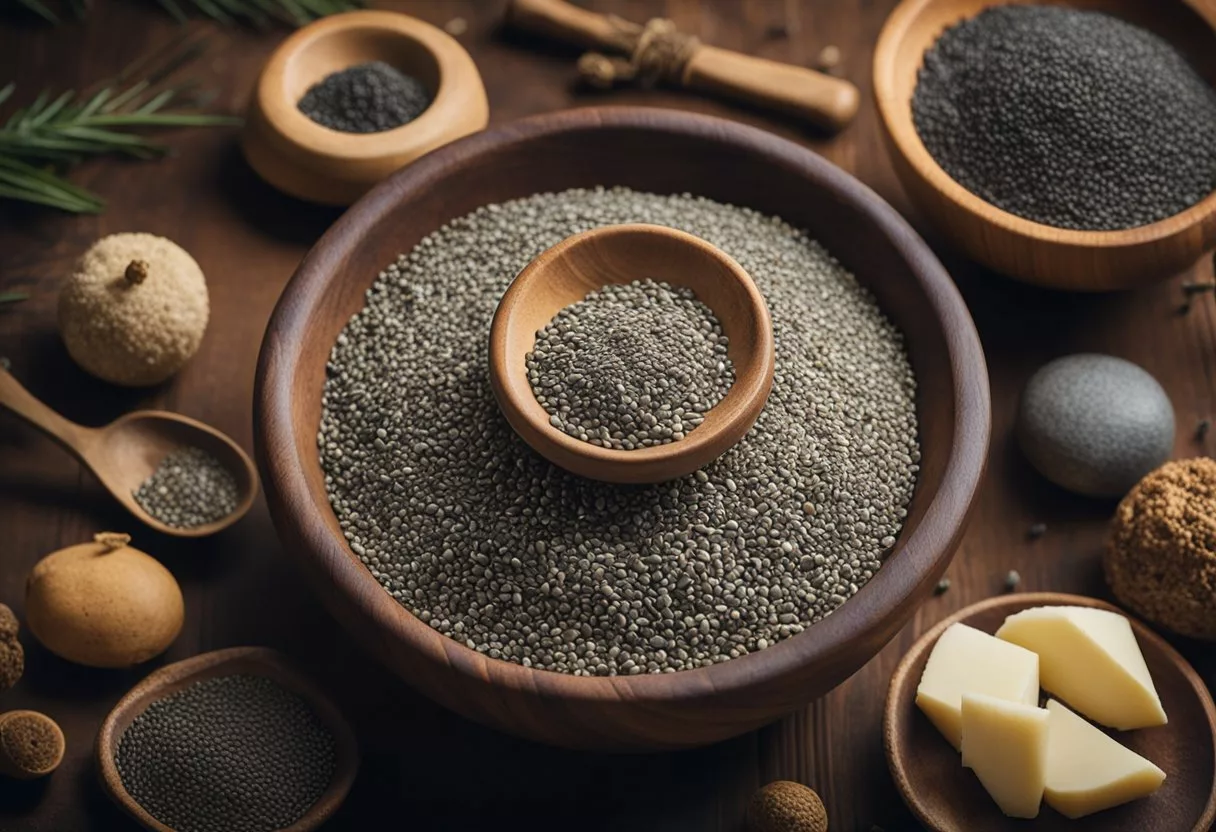
Chia Seeds in Ancient Civilizations
Chia seeds have been consumed for centuries by the Aztecs and Mayans in Central America. The seeds were an essential part of their diet, and they believed that chia seeds had supernatural powers. They used chia seeds as a source of energy during long journeys and battles.
The Aztecs and Mayans also used chia seeds for medicinal purposes. They believed that chia seeds could relieve joint pain, stimulate saliva production, and aid digestion. The Salvia hispanica plant, which produces chia seeds, was considered sacred by the Aztecs and Mayans.
Chia seeds were so important to the Aztecs that they were used as a form of currency. The Aztecs would trade chia seeds for food, clothing, and other goods. The seeds were also used in religious ceremonies and offerings.
Today, chia seeds are still consumed in Central America and have gained popularity in other parts of the world due to their nutritional benefits. Chia seeds are a good source of omega-3 fatty acids, fiber, and protein. They can be easily added to smoothies, yogurt, oatmeal, and salads.
In conclusion, chia seeds have a rich history and cultural significance in Central America. The Aztecs and Mayans considered chia seeds to be a superfood with supernatural powers. Chia seeds were used for medicinal purposes, as a source of energy, and as a form of currency. Today, chia seeds are popular for their nutritional benefits and can be easily incorporated into one’s diet.
Practical Tips for Daily Consumption
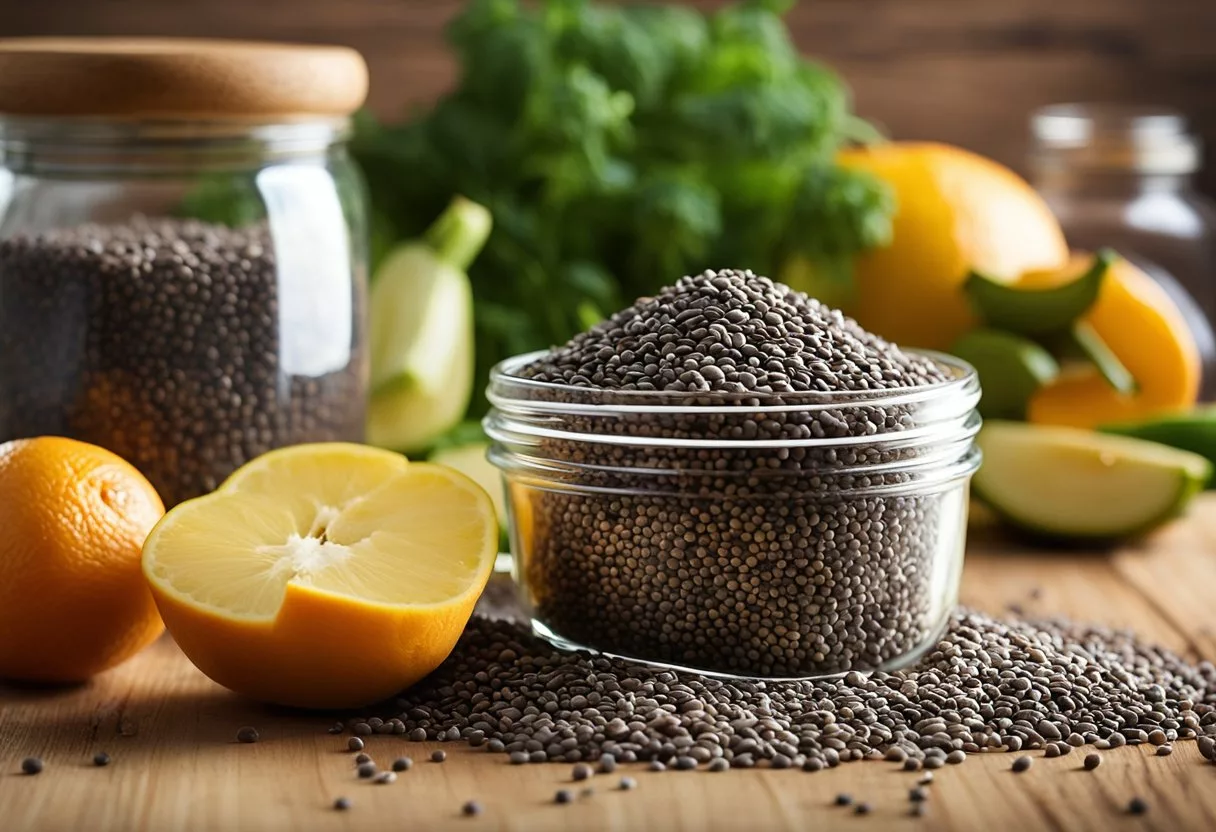
Recommended Daily Intake
Chia seeds are a versatile and nutrient-rich food that can be easily incorporated into a daily diet. According to Harvard Health, a daily intake of 20-35 grams of fiber is recommended for adults. Two tablespoons of chia seeds contain almost 10 grams of fiber, which is nearly one-third of the recommended daily intake.
It is important to note that while chia seeds are a healthy addition to a diet, they should not be considered a miracle food. Consuming excessive amounts of chia seeds can lead to digestive issues, as they are high in fiber. Therefore, it is recommended to start with a small amount and gradually increase the intake over time.
Hydration and Preparation Techniques
Chia seeds can be consumed in a variety of ways, including adding them to smoothies, oatmeal, yogurt, or salads. When consuming chia seeds, it is important to stay hydrated, as they absorb water and expand in the stomach. This can lead to feelings of fullness and satiety, which can aid in weight loss.
To avoid digestive issues, it is recommended to soak chia seeds in warm water for at least 10-15 minutes before consuming them. This allows the seeds to absorb water and become gel-like, making them easier to digest. Additionally, it is important to consume chia seeds in moderation and to balance them with other plant-based sources of protein and fiber.
In summary, chia seeds are a healthy and nutrient-rich food that can be easily incorporated into a daily diet. To maximize their benefits, it is recommended to consume them in moderation, stay hydrated, and prepare them properly. By following these practical tips, individuals can enjoy the many health benefits of chia seeds without experiencing any negative side effects.